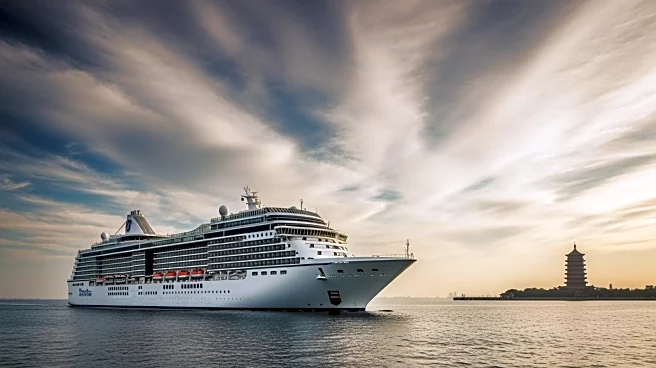What's Happening?
China has introduced new 'special port fees' for visiting cruise ships, effective October 14, as a reciprocal measure to U.S. port fees targeting Chinese-owned and operated ships. This move is part of
a broader response to the U.S. Trade Representative's program addressing China's dominance in the shipbuilding industry. The fees are significant, with the Marshall Islands-flagged cruise ship Riviera, operated by Oceania Cruises, facing approximately $1.6 million in additional costs, prompting a diversion from Shanghai to Busan, South Korea. Meanwhile, Royal Caribbean's Spectrum of the Seas, homeported in Shanghai, received a waiver for these fees, highlighting a selective application of the policy. The fees, which are set to increase by 2028, could lead cruise lines to reconsider port calls in China, affecting companies like Disney Cruise Line and others primarily owned by U.S.-based corporations.
Why It's Important?
The imposition of special port fees by China could significantly impact the U.S. cruise industry, particularly companies like Carnival Corporation, Royal Caribbean Group, and Norwegian Cruise Line Holdings, which dominate the market. These fees could deter cruise lines from scheduling port calls in China, affecting their operational strategies and potentially leading to financial losses. The selective application of fee waivers suggests a strategic approach by China to protect its domestic cruise market while imposing costs on foreign operators. This development could exacerbate trade tensions between the U.S. and China, influencing broader economic relations and impacting stakeholders in the cruise and shipping industries.
What's Next?
Cruise lines may need to reassess their itineraries and port call strategies in response to China's new fees. Companies like Disney Cruise Line, which had planned calls in Shanghai, might cancel these plans, affecting their market presence in Asia. The U.S. cruise industry could lobby for diplomatic interventions or seek alternative routes to mitigate the financial impact. Additionally, the increase in fees by 2028 could prompt long-term strategic shifts in cruise operations, potentially leading to reduced engagement with Chinese ports unless exemptions are negotiated.
Beyond the Headlines
The introduction of special port fees by China reflects broader geopolitical dynamics and trade tensions with the U.S. It underscores the strategic use of economic measures in international relations, potentially influencing future negotiations and trade policies. The selective fee waivers for certain ships highlight China's focus on protecting its domestic market while challenging foreign competitors, which could lead to shifts in global cruise industry dynamics and influence international maritime policies.











